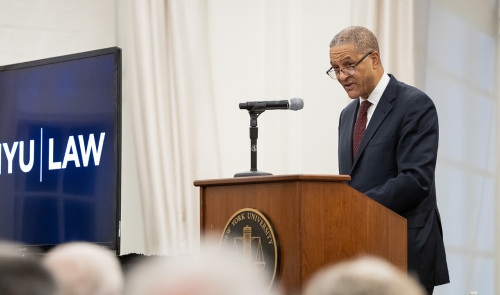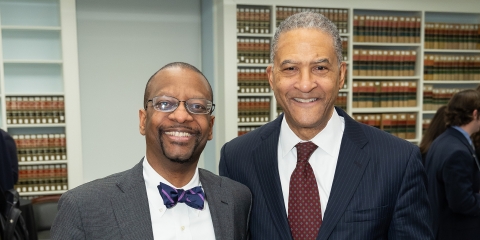In Madison Lecture, Judge Raymond Lohier ’91 advocates for empathetic judging

Judge Raymond Lohier ’91 of the US Court of Appeals for the Second Circuit explored what he called “a judicial transformation” in the 55th annual James Madison Lecture on February 11.
In remarks titled “Judicial Gymnastics: Principles, Priorities, and Empathy,” Lohier examined inconsistencies in procedural rulings that, he said, have resulted in “unpredictability” in how judicial power is wielded. Lohier argued for “empathetic judging” as a way to avoid bias in judicial decision making.
An NYU Law trustee, Lohier has sat on the Second Circuit bench since 2011. He is a former Assistant US Attorney in the US Attorney’s Office for the Southern District of New York, where he served as senior counsel, deputy chief and chief of the Securities and Commodities Fraud Task Force, and deputy chief and chief of the Narcotics Unit.
Lohier compared the US Supreme Court’s 2021 decision on standing in Uzuegbunam v. Preczewski with the Court’s ruling two years later in Biden v. Nebraska. In Uzuegbunam, the justices ruled 8-1 that the nominal damages sought by a student challenging a free-speech zone at Georgia Gwinnett College were sufficient to establish standing. Chief Justice John Roberts dissented, criticizing the ruling as “a radical expansion of the judicial power.” But, Lohier pointed out, some two years later Chief Justice Roberts wrote the majority opinion in Biden v. Nebraska that allowed the state of Missouri to challenge the Biden administration’s student loan forgiveness program on the basis of harms suffered by a nonprofit government corporation that services student loans, the Missouri Higher Education Loan Authority. In his opinion, Lohier noted, Chief Justice Roberts took aim at the dissent in Biden: “It has become a disturbing feature of some recent opinions to criticize the decisions with which they disagree as going beyond the proper role of the judiciary.”

Lohier also referenced the Court’s decision in Dobbs v. Jackson Women’s Health Organization, which returned the regulation of abortion to individual states in 2022, overturning a 50-year federal precedent. “Certain principles rooted in judicial restraint and limited jurisdiction seem to have yielded to substantive values and new approaches, including a new focus on history and tradition, with the result that the scope and sometimes the very existence of certain rights appear to be vulnerable to revision,” Lohier said.
Any retreat from longstanding principles of judicial restraint could have long-term consequences, Lohier said. “Regardless of one’s point of view, the possibility that...core doctrines [on jurisdiction and procedure] could change in empirically significant ways, depending on the underlying merits or issues of a case, is to say the least troubling,” he said, “especially at a time when the legal academy and the bar have raised pointed and legitimate questions about judicial decision-making [with] questions that are matched by historically low approval ratings and flagging public confidence.”
He closed by suggesting a new approach to judging that is rooted in empathy, humility and imagination. “I think that my friends on the Court will agree that judging is a hard business and we can be uncertain even in cases where we think there must be a right answer,” Lohier said. “But let me conclude by outlining an approach for judges who want to guard against letting their views on substance infect important principles of jurisdiction and procedure…. Empathetic judging encourages us to take the extra step of asking in every case where it might matter, what if the roles were reversed? What if the plaintiff on the losing side was someone whose values I supported or the defendant on the winning side was someone whose values I deplored?”
“When, on matters of procedure, you understand that, over time, the wheel of judicial power can turn against your preferences and against your values and against your views,” he added, “then empathy, empathetic judging, and judicial humility exercised consistently over time can help uphold institutional integrity, guard against procedural incoherence, and, one hopes, reverse the current slide in public confidence in courts.”


